Personal and Professional Development: Reflective Report (BMS406)
VerifiedAdded on 2022/12/28
|6
|1307
|2
Report
AI Summary
This reflective report, prepared for a Foundation Degree in Business and Management, examines the essential skills required for higher education learners. The report identifies and describes key skills such as effective teamwork, academic writing, skills of reflection, presentation skills, communication and IT skills, and problem-solving and decision-making. It emphasizes the importance of these skills for academic success and professional development. The report includes a personal and professional development plan, providing a self-assessment of current skill levels and outlining strategies for improvement in areas such as teamwork, academic writing, reflection, presentation, communication, and problem-solving. The plan uses a tabular structure to show current proficiency levels, desired improvements, and timeframes for achieving these improvements, demonstrating a commitment to continuous learning and skill enhancement. The report concludes by emphasizing the significance of these skills for higher education learners and their role in fostering knowledge, experience, and professional growth.
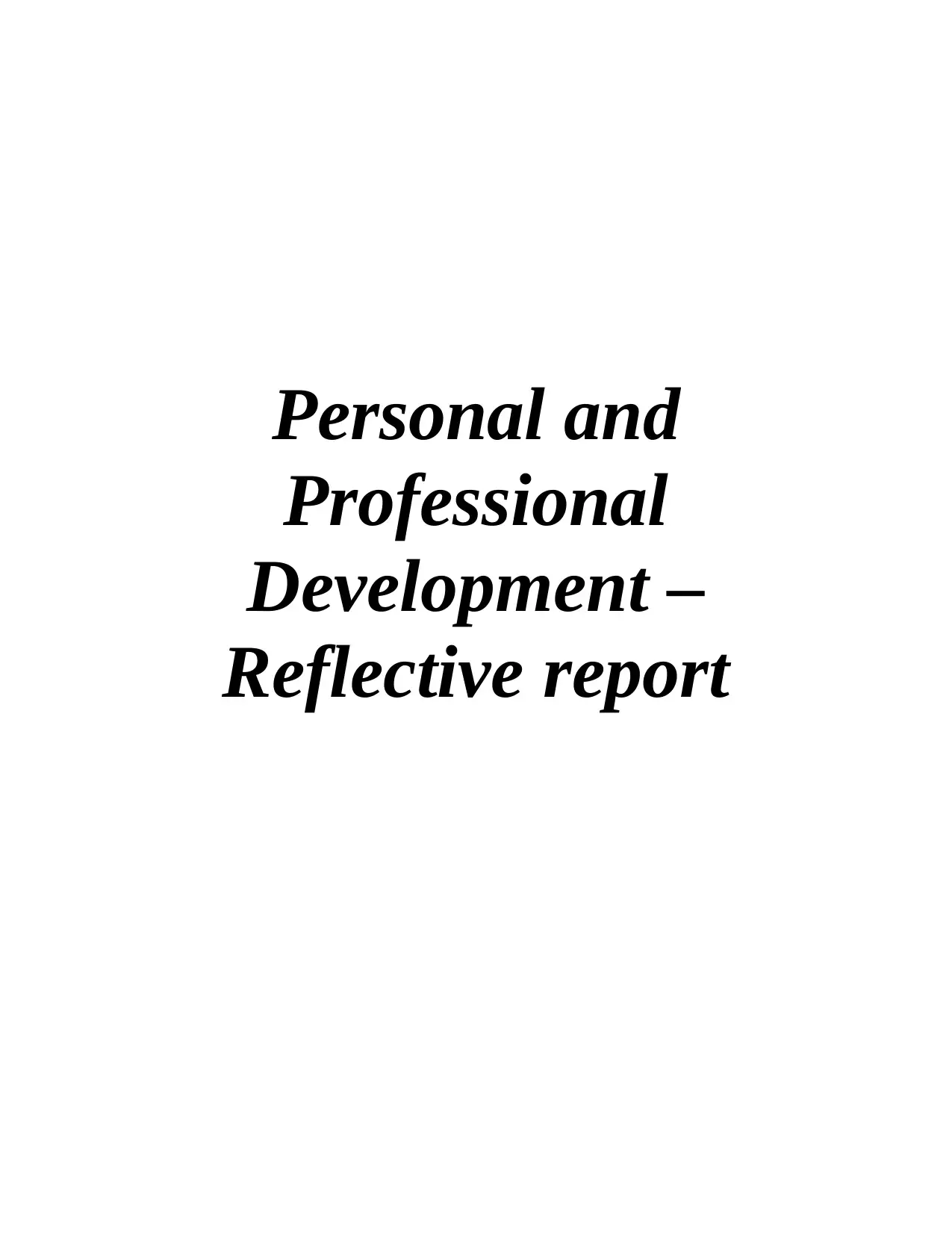
Personal and
Professional
Development –
Reflective report
Professional
Development –
Reflective report
Paraphrase This Document
Need a fresh take? Get an instant paraphrase of this document with our AI Paraphraser
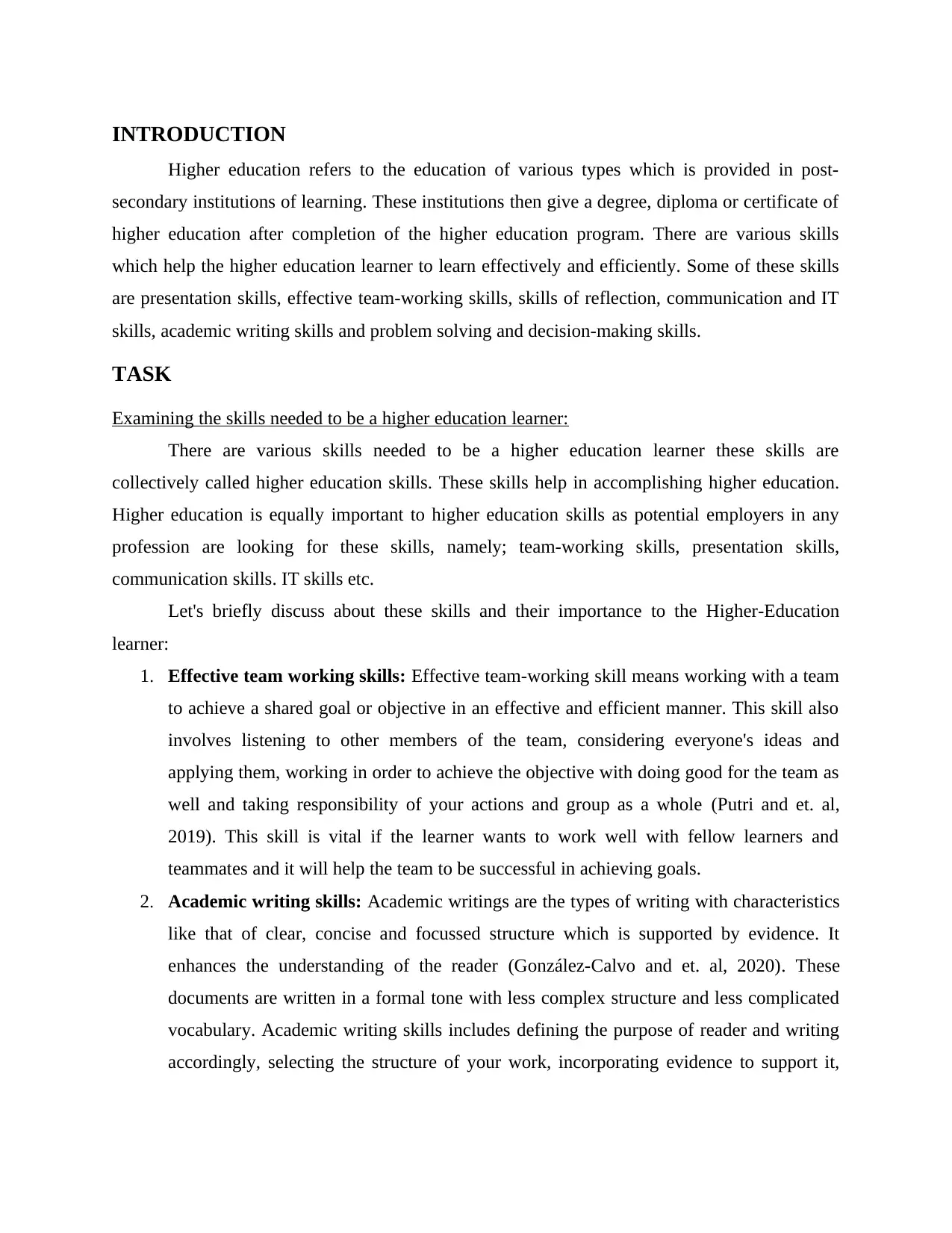
INTRODUCTION
Higher education refers to the education of various types which is provided in post-
secondary institutions of learning. These institutions then give a degree, diploma or certificate of
higher education after completion of the higher education program. There are various skills
which help the higher education learner to learn effectively and efficiently. Some of these skills
are presentation skills, effective team-working skills, skills of reflection, communication and IT
skills, academic writing skills and problem solving and decision-making skills.
TASK
Examining the skills needed to be a higher education learner:
There are various skills needed to be a higher education learner these skills are
collectively called higher education skills. These skills help in accomplishing higher education.
Higher education is equally important to higher education skills as potential employers in any
profession are looking for these skills, namely; team-working skills, presentation skills,
communication skills. IT skills etc.
Let's briefly discuss about these skills and their importance to the Higher-Education
learner:
1. Effective team working skills: Effective team-working skill means working with a team
to achieve a shared goal or objective in an effective and efficient manner. This skill also
involves listening to other members of the team, considering everyone's ideas and
applying them, working in order to achieve the objective with doing good for the team as
well and taking responsibility of your actions and group as a whole (Putri and et. al,
2019). This skill is vital if the learner wants to work well with fellow learners and
teammates and it will help the team to be successful in achieving goals.
2. Academic writing skills: Academic writings are the types of writing with characteristics
like that of clear, concise and focussed structure which is supported by evidence. It
enhances the understanding of the reader (González-Calvo and et. al, 2020). These
documents are written in a formal tone with less complex structure and less complicated
vocabulary. Academic writing skills includes defining the purpose of reader and writing
accordingly, selecting the structure of your work, incorporating evidence to support it,
Higher education refers to the education of various types which is provided in post-
secondary institutions of learning. These institutions then give a degree, diploma or certificate of
higher education after completion of the higher education program. There are various skills
which help the higher education learner to learn effectively and efficiently. Some of these skills
are presentation skills, effective team-working skills, skills of reflection, communication and IT
skills, academic writing skills and problem solving and decision-making skills.
TASK
Examining the skills needed to be a higher education learner:
There are various skills needed to be a higher education learner these skills are
collectively called higher education skills. These skills help in accomplishing higher education.
Higher education is equally important to higher education skills as potential employers in any
profession are looking for these skills, namely; team-working skills, presentation skills,
communication skills. IT skills etc.
Let's briefly discuss about these skills and their importance to the Higher-Education
learner:
1. Effective team working skills: Effective team-working skill means working with a team
to achieve a shared goal or objective in an effective and efficient manner. This skill also
involves listening to other members of the team, considering everyone's ideas and
applying them, working in order to achieve the objective with doing good for the team as
well and taking responsibility of your actions and group as a whole (Putri and et. al,
2019). This skill is vital if the learner wants to work well with fellow learners and
teammates and it will help the team to be successful in achieving goals.
2. Academic writing skills: Academic writings are the types of writing with characteristics
like that of clear, concise and focussed structure which is supported by evidence. It
enhances the understanding of the reader (González-Calvo and et. al, 2020). These
documents are written in a formal tone with less complex structure and less complicated
vocabulary. Academic writing skills includes defining the purpose of reader and writing
accordingly, selecting the structure of your work, incorporating evidence to support it,
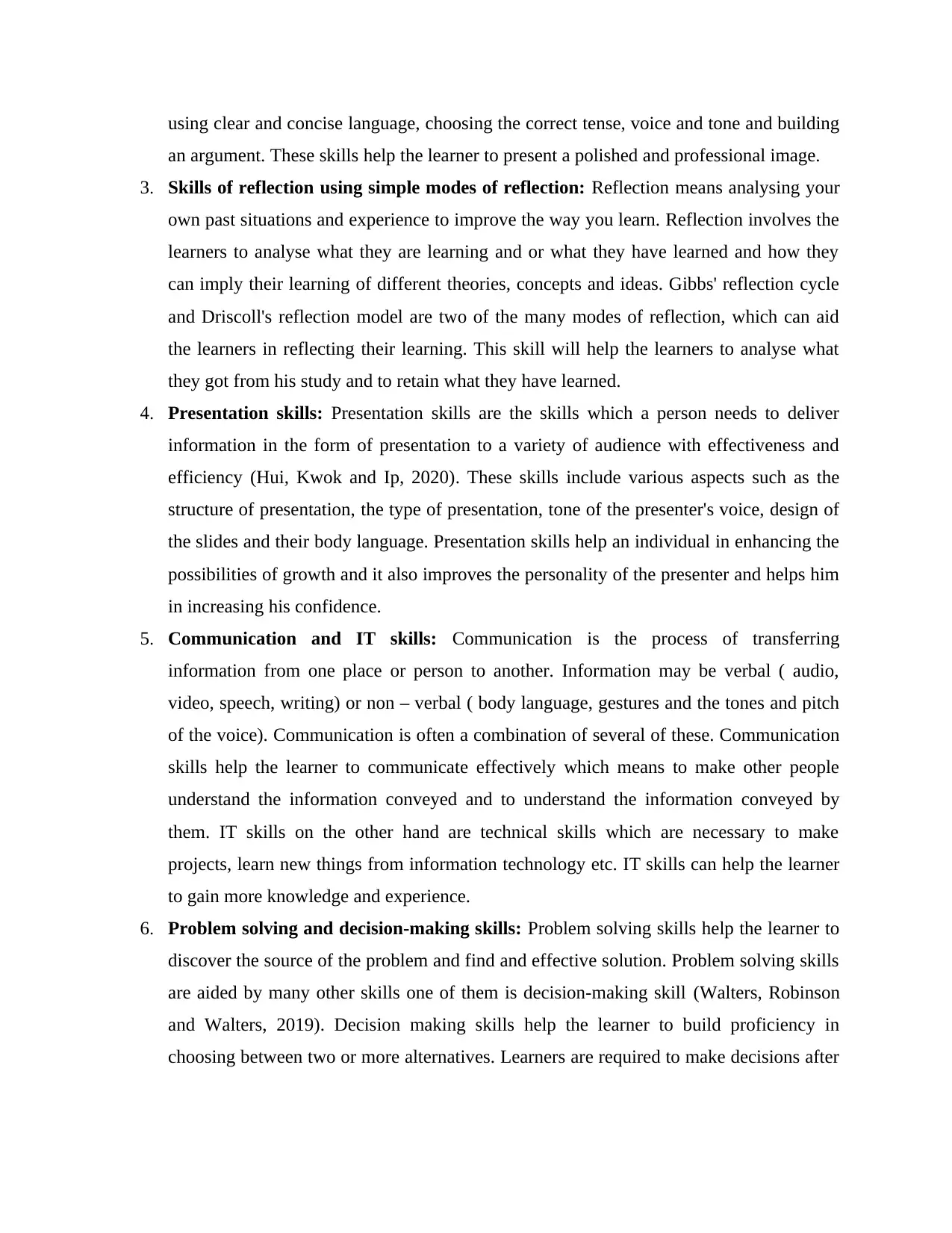
using clear and concise language, choosing the correct tense, voice and tone and building
an argument. These skills help the learner to present a polished and professional image.
3. Skills of reflection using simple modes of reflection: Reflection means analysing your
own past situations and experience to improve the way you learn. Reflection involves the
learners to analyse what they are learning and or what they have learned and how they
can imply their learning of different theories, concepts and ideas. Gibbs' reflection cycle
and Driscoll's reflection model are two of the many modes of reflection, which can aid
the learners in reflecting their learning. This skill will help the learners to analyse what
they got from his study and to retain what they have learned.
4. Presentation skills: Presentation skills are the skills which a person needs to deliver
information in the form of presentation to a variety of audience with effectiveness and
efficiency (Hui, Kwok and Ip, 2020). These skills include various aspects such as the
structure of presentation, the type of presentation, tone of the presenter's voice, design of
the slides and their body language. Presentation skills help an individual in enhancing the
possibilities of growth and it also improves the personality of the presenter and helps him
in increasing his confidence.
5. Communication and IT skills: Communication is the process of transferring
information from one place or person to another. Information may be verbal ( audio,
video, speech, writing) or non – verbal ( body language, gestures and the tones and pitch
of the voice). Communication is often a combination of several of these. Communication
skills help the learner to communicate effectively which means to make other people
understand the information conveyed and to understand the information conveyed by
them. IT skills on the other hand are technical skills which are necessary to make
projects, learn new things from information technology etc. IT skills can help the learner
to gain more knowledge and experience.
6. Problem solving and decision-making skills: Problem solving skills help the learner to
discover the source of the problem and find and effective solution. Problem solving skills
are aided by many other skills one of them is decision-making skill (Walters, Robinson
and Walters, 2019). Decision making skills help the learner to build proficiency in
choosing between two or more alternatives. Learners are required to make decisions after
an argument. These skills help the learner to present a polished and professional image.
3. Skills of reflection using simple modes of reflection: Reflection means analysing your
own past situations and experience to improve the way you learn. Reflection involves the
learners to analyse what they are learning and or what they have learned and how they
can imply their learning of different theories, concepts and ideas. Gibbs' reflection cycle
and Driscoll's reflection model are two of the many modes of reflection, which can aid
the learners in reflecting their learning. This skill will help the learners to analyse what
they got from his study and to retain what they have learned.
4. Presentation skills: Presentation skills are the skills which a person needs to deliver
information in the form of presentation to a variety of audience with effectiveness and
efficiency (Hui, Kwok and Ip, 2020). These skills include various aspects such as the
structure of presentation, the type of presentation, tone of the presenter's voice, design of
the slides and their body language. Presentation skills help an individual in enhancing the
possibilities of growth and it also improves the personality of the presenter and helps him
in increasing his confidence.
5. Communication and IT skills: Communication is the process of transferring
information from one place or person to another. Information may be verbal ( audio,
video, speech, writing) or non – verbal ( body language, gestures and the tones and pitch
of the voice). Communication is often a combination of several of these. Communication
skills help the learner to communicate effectively which means to make other people
understand the information conveyed and to understand the information conveyed by
them. IT skills on the other hand are technical skills which are necessary to make
projects, learn new things from information technology etc. IT skills can help the learner
to gain more knowledge and experience.
6. Problem solving and decision-making skills: Problem solving skills help the learner to
discover the source of the problem and find and effective solution. Problem solving skills
are aided by many other skills one of them is decision-making skill (Walters, Robinson
and Walters, 2019). Decision making skills help the learner to build proficiency in
choosing between two or more alternatives. Learners are required to make decisions after
⊘ This is a preview!⊘
Do you want full access?
Subscribe today to unlock all pages.

Trusted by 1+ million students worldwide
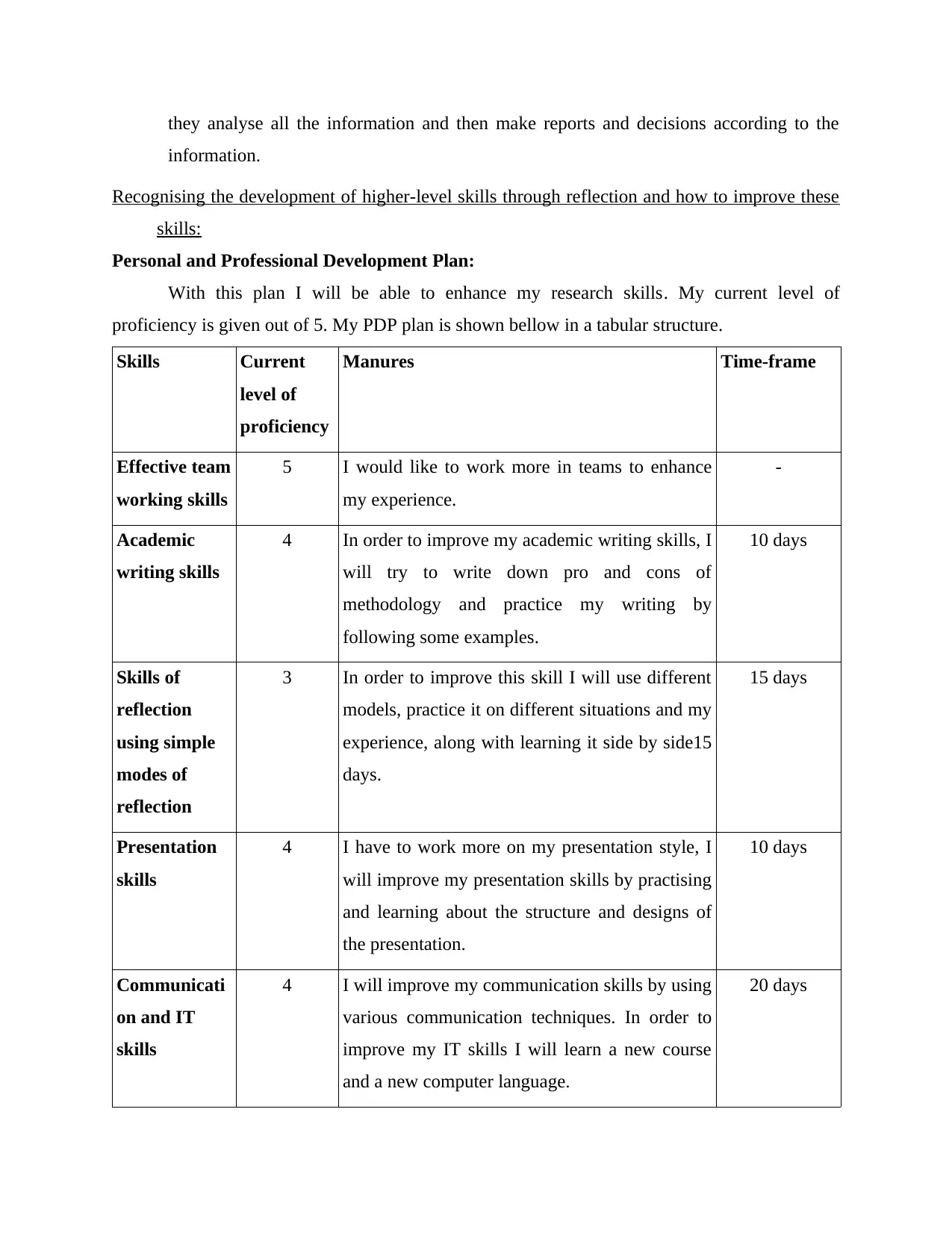
they analyse all the information and then make reports and decisions according to the
information.
Recognising the development of higher-level skills through reflection and how to improve these
skills:
Personal and Professional Development Plan:
With this plan I will be able to enhance my research skills. My current level of
proficiency is given out of 5. My PDP plan is shown bellow in a tabular structure.
Skills Current
level of
proficiency
Manures Time-frame
Effective team
working skills
5 I would like to work more in teams to enhance
my experience.
-
Academic
writing skills
4 In order to improve my academic writing skills, I
will try to write down pro and cons of
methodology and practice my writing by
following some examples.
10 days
Skills of
reflection
using simple
modes of
reflection
3 In order to improve this skill I will use different
models, practice it on different situations and my
experience, along with learning it side by side15
days.
15 days
Presentation
skills
4 I have to work more on my presentation style, I
will improve my presentation skills by practising
and learning about the structure and designs of
the presentation.
10 days
Communicati
on and IT
skills
4 I will improve my communication skills by using
various communication techniques. In order to
improve my IT skills I will learn a new course
and a new computer language.
20 days
information.
Recognising the development of higher-level skills through reflection and how to improve these
skills:
Personal and Professional Development Plan:
With this plan I will be able to enhance my research skills. My current level of
proficiency is given out of 5. My PDP plan is shown bellow in a tabular structure.
Skills Current
level of
proficiency
Manures Time-frame
Effective team
working skills
5 I would like to work more in teams to enhance
my experience.
-
Academic
writing skills
4 In order to improve my academic writing skills, I
will try to write down pro and cons of
methodology and practice my writing by
following some examples.
10 days
Skills of
reflection
using simple
modes of
reflection
3 In order to improve this skill I will use different
models, practice it on different situations and my
experience, along with learning it side by side15
days.
15 days
Presentation
skills
4 I have to work more on my presentation style, I
will improve my presentation skills by practising
and learning about the structure and designs of
the presentation.
10 days
Communicati
on and IT
skills
4 I will improve my communication skills by using
various communication techniques. In order to
improve my IT skills I will learn a new course
and a new computer language.
20 days
Paraphrase This Document
Need a fresh take? Get an instant paraphrase of this document with our AI Paraphraser
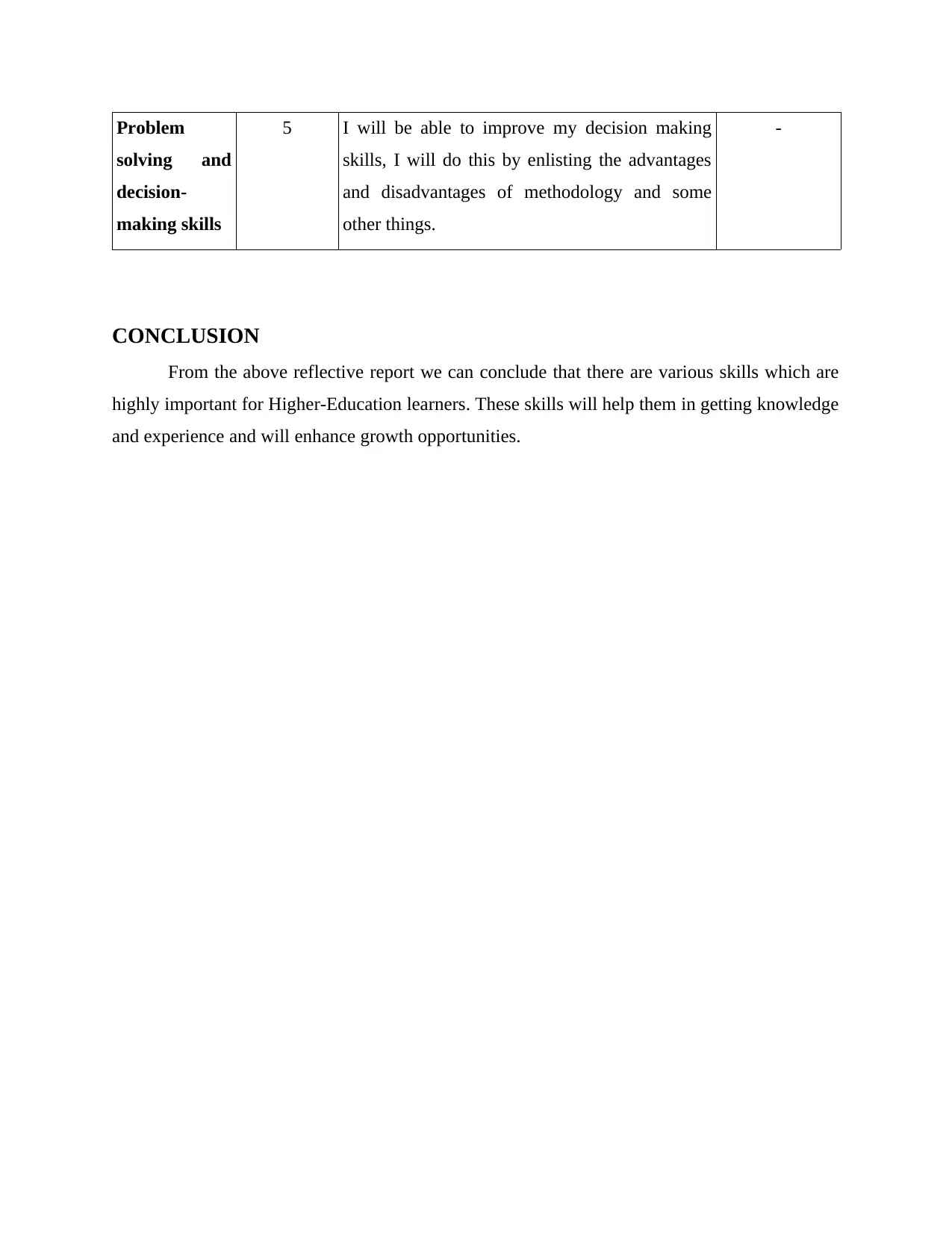
Problem
solving and
decision-
making skills
5 I will be able to improve my decision making
skills, I will do this by enlisting the advantages
and disadvantages of methodology and some
other things.
-
CONCLUSION
From the above reflective report we can conclude that there are various skills which are
highly important for Higher-Education learners. These skills will help them in getting knowledge
and experience and will enhance growth opportunities.
solving and
decision-
making skills
5 I will be able to improve my decision making
skills, I will do this by enlisting the advantages
and disadvantages of methodology and some
other things.
-
CONCLUSION
From the above reflective report we can conclude that there are various skills which are
highly important for Higher-Education learners. These skills will help them in getting knowledge
and experience and will enhance growth opportunities.
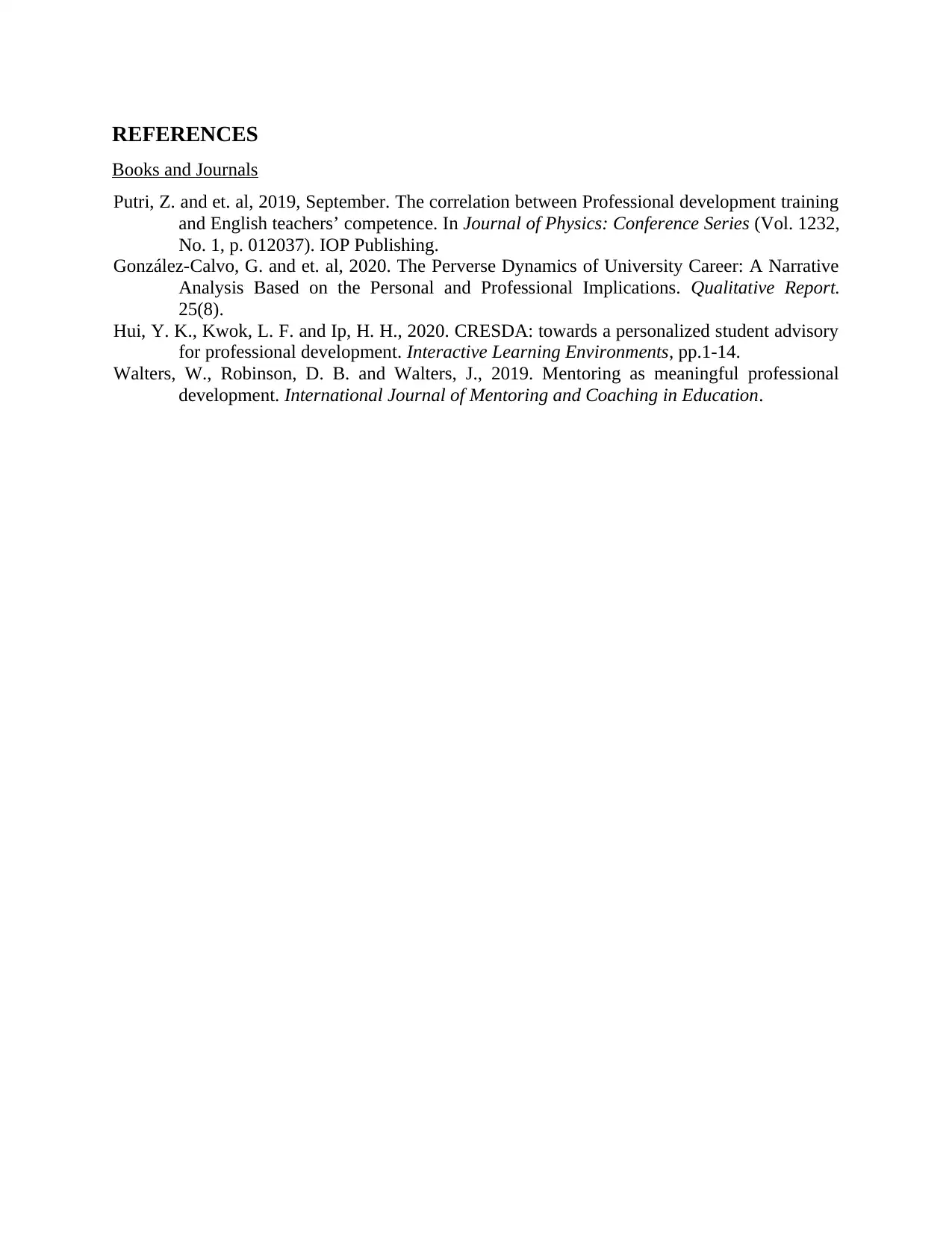
REFERENCES
Books and Journals
Putri, Z. and et. al, 2019, September. The correlation between Professional development training
and English teachers’ competence. In Journal of Physics: Conference Series (Vol. 1232,
No. 1, p. 012037). IOP Publishing.
González-Calvo, G. and et. al, 2020. The Perverse Dynamics of University Career: A Narrative
Analysis Based on the Personal and Professional Implications. Qualitative Report.
25(8).
Hui, Y. K., Kwok, L. F. and Ip, H. H., 2020. CRESDA: towards a personalized student advisory
for professional development. Interactive Learning Environments, pp.1-14.
Walters, W., Robinson, D. B. and Walters, J., 2019. Mentoring as meaningful professional
development. International Journal of Mentoring and Coaching in Education.
Books and Journals
Putri, Z. and et. al, 2019, September. The correlation between Professional development training
and English teachers’ competence. In Journal of Physics: Conference Series (Vol. 1232,
No. 1, p. 012037). IOP Publishing.
González-Calvo, G. and et. al, 2020. The Perverse Dynamics of University Career: A Narrative
Analysis Based on the Personal and Professional Implications. Qualitative Report.
25(8).
Hui, Y. K., Kwok, L. F. and Ip, H. H., 2020. CRESDA: towards a personalized student advisory
for professional development. Interactive Learning Environments, pp.1-14.
Walters, W., Robinson, D. B. and Walters, J., 2019. Mentoring as meaningful professional
development. International Journal of Mentoring and Coaching in Education.
⊘ This is a preview!⊘
Do you want full access?
Subscribe today to unlock all pages.

Trusted by 1+ million students worldwide
1 out of 6
Related Documents
Your All-in-One AI-Powered Toolkit for Academic Success.
+13062052269
info@desklib.com
Available 24*7 on WhatsApp / Email
![[object Object]](/_next/static/media/star-bottom.7253800d.svg)
Unlock your academic potential
Copyright © 2020–2025 A2Z Services. All Rights Reserved. Developed and managed by ZUCOL.



